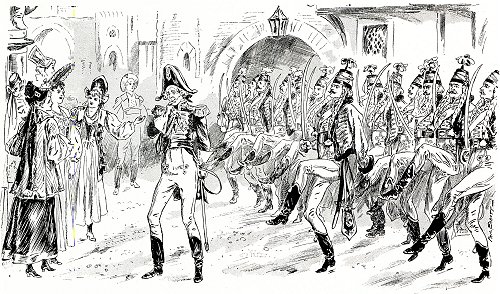 |
 |
||||||
![]()
In December 1893 Gilbert and Sullivan had met to discuss a joint work which would follow Utopia, Limited at the Savoy, and by 10th January Gilbert had the outline of the plot to show to Sullivan. But Gilbert wanted to include a part for Nancy McIntosh who had created the role of Princess Zara in Utopia. It was Gilbert who had encouraged her to go onto the stage, and he felt some responsibility to help her further her career. He had also become involved in her personal life, advising her on her financial affairs and inviting her to stay with himself and his wife.
But Sullivan and the Cartes felt differently: Nancy may have been a decent singer, but she was a poor actress and they did not want her to be engaged for the next opera. In March 1894, Sullivan wrote to Gilbert saying that he would not write another opera with Gilbert if there was a part for Nancy in it.
Gilbert then tried to persuade George Henschel to compose the score for the planned opera, but nothing came of that proposed collaboration and so he turned to Osmond Carr to provide the music.
His Excellency, as the opera had been titled, opened at the Lyric Theatre, under the management of George Edwardes on 27th October 1894 with many actors who had previously appeared in the Gilbert and Sullivan operas: George Grossmith, Rutland Barrington, Jessie Bond, Alice Barnett, George Temple as well as Nancy McIntosh and Charles Kenningham. The Savoy had closed when the run of Mirette ended after 41 performances and many of the Savoy choristers felt they would have a more certain future if they made the move from the Savoy to the Lyric.
Helen D'Oyly Carte accused Gilbert of poaching her chorus. Gilbert denied this and a course of correspondence ensued between Gilbert and Mrs. Carte. Eventually Mrs. Carte admitted that Gilbert had not offered any inducement to any chorister to abandon the Savoy.
His Excellency was well recieved on its opening night: Grossmith, Barrington, Bond and Terris finding favour both with the audience and the critics. Funniest of all the cast was the male chorus as the King's Hussars, led by Arthur Playfair, whom the Governor (a man addicted to practical jokes) forces to drill as though they were a corps de ballet.

Carr's score was less well received by the critics. He was young and inexperienced as a composer of comic opera and whilst some of the reviews called his music "pretty", "peculiarly appropriate" and "sometimes gay and not infrequently humorous" others thought he tended to monotony, lacked Sullivan's humour, or was overshadowed by Gilbert's "muscular" book. Shortly after the opening, on 4th November, Gilbert wrote to Helen Carte: "The piece is doing admirably & seems in for a long run. If it had had the advantage of your expensive friend Sullivan's music, it would have been a second Mikado."
The Gilberts went on a cruise in January 1895, and when they returned in mid March 1895 Gilbert was disappointed to find that His Excellency was on the verge of closing. The London theatres were doing bad business owing to a severe outbreak of influenza in the capital. The actors volunteered to take a cut in salary in an attempt to keep the theatre open, but despite this His Excellency closed on 6th April after 162 performances. Perhaps with a better score, and had Gilbert been around in the first few weeks of its run to make his usual post production adjustments the piece would have been more successful.
However, Edwardes was able to send out
a fairly successful provincial touring company with the piece and another,
with some of the London cast, to America.
|
Page modified 16 August 2011